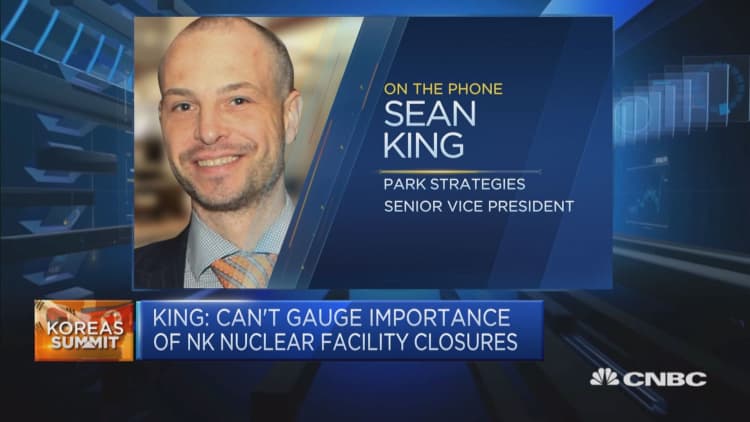The third round of bilateral talks between South Korean President Moon Jae-in and North Korean leader Kim Jong Un officially concluded Thursday but many believe it failed to make any breakthroughs on freeing the peninsula of nuclear weapons.
The burden is now on Washington to negotiate more concessions from the reclusive state, experts say.
Moon and Kim this week signed the September Pyongyang Joint Declaration, in which the isolated country promised a shut down of the missile-engine testing facility and launchpad at Tongchang-ri, in the west coast of North Korea. Pyongyang also said it was willing to permanently close the Yongbyon nuclear site — where the country produced plutonium used in its first atomic weapons test — if the United States took reciprocal action.
The signed accord is rife with ambiguities, analysts at the Center for Strategic and International Studies (CSIS) said in a note. "Experts in the Trump administration will likely be unimpressed by the specifics announced in Pyongyang, which means the hard work remains for the U.S. negotiators," they said.
A closer look at the agreement shows "there's really not a lot there," echoed Sean King, senior vice president of Park Strategies, a business advisory firm. "I'm a little concerned as to where we go from here," he said.
However, the declaration was a positive for Pyongyang's relations with the international community, especially with Washington, which will likely use the latest momentum to set up a second meeting between Kim and President Donald Trump. The Moon government also obtained an agreement to ease the process of family reunions and start construction on road projects connecting the two Koreas by year-end. Kim said he will visit Seoul soon, which would be the first time a North Korean leader visits the South's capital.

Lack of clarity
Many pointed out that Kim's promise to shutter the Tongchang-ri missile testing site didn't carry much weight since it had already been slated for closure.
Its shutdown is also not likely to make a dent in Pyongyang's intercontinental ballistic missile program, King noted, explaining that the facility tests liquid fuel engines but North Korea now uses solid fuel.
The document lacked details on the country's uranium-based nuclear program, a timeline for dismantlement as well as clarity on other missile sites, several analysts said. Kim also didn't elaborate on what measures the sought from the White House.
It's unlikely that Washington would make any unilateral concessions without "major movement" from Pyongyang, the CSIS experts added.
But the North Korean regime likely believes it's in a good position to resist U.S. pressure to move faster on denuclearization.
"Kim's skillful diplomacy, as well as an uptick in US-China and US-Russia tensions in other areas, is dampening appetites for playing tough with Kim," according to a note by political consultancy Eurasia Group. "It is also important to remember that Kim has already succeeded in fulfilling his primary objective — reducing the risk of a US military strike to essentially zero," it added.

